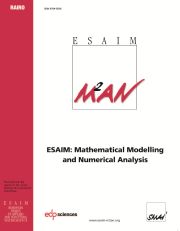Article contents
A quasi-dual Lagrange multiplier space for serendipity mortar finite elements in 3D
Published online by Cambridge University Press: 15 February 2004
Abstract
Domain decomposition techniques provide a flexible tool for the numericalapproximation of partial differential equations. Here, we considermortar techniques for quadratic finite elements in 3D with different Lagrange multiplier spaces.In particular, we focus on Lagrange multiplier spaceswhich yield optimal discretizationschemes and a locally supported basis for the associatedconstrained mortar spaces in case of hexahedral triangulations. As a result,standard efficient iterative solvers as multigrid methodscan be easily adapted to the nonconforming situation.We present the discretization errors in different norms for linear and quadratic mortar finite elements withdifferent Lagrange multiplier spaces.Numerical results illustrate the performance of our approach.
Keywords
Information
- Type
- Research Article
- Information
- ESAIM: Mathematical Modelling and Numerical Analysis , Volume 38 , Issue 1 , January 2004 , pp. 73 - 92
- Copyright
- © EDP Sciences, SMAI, 2004
References
- 7
- Cited by

